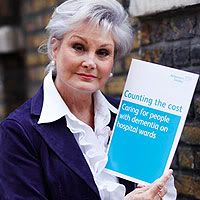 One phrase that has stuck in my head since training for my stint in geriatrics as a student nurse is that "when we create the care that older people receive, we define our own future".
One phrase that has stuck in my head since training for my stint in geriatrics as a student nurse is that "when we create the care that older people receive, we define our own future".Newsreader, broadcaster and dancer Angela Rippon has been appointed Alzheimer's Society Ambassador alongside businessman John Hughes, and both appeared on ITV1's This Morning to mark the launch of an AS report called Counting the Cost. This looks at the reasons why people with dementia tend to be kept in hospital longer than pe
 ople who are not suffering from a dementing process, and at the costs to both individual and Health Service of this.
ople who are not suffering from a dementing process, and at the costs to both individual and Health Service of this.It's not uncommon for somebody to show first symptoms of dementia only when they spend some time in an unfamiliar environment - for example if away on holiday or visiting friends. Thereafter, the environment should change as little as possible: in other words, hospital stays should be as short as possible.
I'm not trying to make carers feel guilty for going off for a much-needed break and putting their loved-one in respite-care, as this would be a nursing home specialising in the care of older people, some with dementia. What the report's saying is that hospital stays should be as short as possible, so that the person with dementia can then recover from their hospital stay in familiar surroundings, whether that be the family home or a nursing home.
The report's findings are compelling: while 97% of nursing staff and nurse managers report that "they always or sometimes care for someone with dementia", "47% of carer respondents said that being in hospital had a significant negative effect on the general physical health of the person with dementia, which wasn’t a direct result of the medical condition" and "54% of carer respondents said that being in hospital had a significant negative effect on the symptoms of dementia, such as becoming more confused and less independent".
 The best-known example of this is inappropriate prescription of medications, predominantly antipsychotics, but also others. On my second night as a patient in a psychiatric ward, I found I'd been prescribed a sleeping tablet because, I think, my tossing and turning on a clanky hospital bed had been quite loud: the prescription had no bearing on my condition. How much more would people with dementia, who might not be able to tell the difference between night and day, be vulnerable to inappropriate prescription? (I'm on an antipsychotic, appropriately prescribed for manic depression, that can knock me out - I wouldn't like to see its effect on a frail older person who wasn't alert to all the cues warning of danger of falls, etc.)
The best-known example of this is inappropriate prescription of medications, predominantly antipsychotics, but also others. On my second night as a patient in a psychiatric ward, I found I'd been prescribed a sleeping tablet because, I think, my tossing and turning on a clanky hospital bed had been quite loud: the prescription had no bearing on my condition. How much more would people with dementia, who might not be able to tell the difference between night and day, be vulnerable to inappropriate prescription? (I'm on an antipsychotic, appropriately prescribed for manic depression, that can knock me out - I wouldn't like to see its effect on a frail older person who wasn't alert to all the cues warning of danger of falls, etc.)I've got a lot of time for the Alzheimer's Society, as when Baroness Warnock, former chairman of the Committee of Inquiry into Human Fertilisation and Embryology, proclaimed that "dementia sufferers should consider ending their lives through euthanasia because of the strain they put on their families and public services", the Society's president, Neil Hunt, expressed his horror that somebo
 dy in a public position could "disregard the value of the lives of people with dementia so callously...that they should feel that they have some sort of duty to kill themselves is nothing short of barbaric".
dy in a public position could "disregard the value of the lives of people with dementia so callously...that they should feel that they have some sort of duty to kill themselves is nothing short of barbaric".The Society, in its paper, gives a powerful incentive for NHS trusts to consider giving dementia patients as short a stay as possible - the bottom line. The full report goes into detail what savings could be made in which circumstances, but the executive summary delivers the money-shot:
This report finds that supporting people with dementia to leave hospital one week sooner than they currently do could result in savings of at least £80 million a year...It would not be unreasonable to assume that there are savings to be made in care for peoplAnd, as Angela Rippon, proof (if it were needed) that one can be 65 and glamorous, said on This Morning of the art and science of caring for older people: "We're all going there".e with dementia running into hundreds of millions of pounds, which could be more effectively reinvested.











Not just pills, but has seemed to me, in personal experiences with family members, that anaesthesia causes a significant increase in symptoms of dementia. A scarily significant increase. Any research on this?
ReplyDeleteI'll have a look tomorrow - I'm all tied up today with work stuff - FD
ReplyDeleteMedication is control. You can over medicate or undermedicate a person in your care in order to put them in a state that makes them easier to manage.
ReplyDeleteI admit, there were times that I needed a break caring for my ma that never got. There were times I resented the strain. Now, the only thing I regret was my resentment and I'd give anything to have her back, even if she didn't have her mind straight. To hear anyone disregard the life of an elderly person makes my skin crawl.
Pam - sorry I never got back to you yesterday; my daughter being ill during the day and a meeting in the evening ensured I couldn't get to the computer. I can't find much on the subject - is this any help?
ReplyDeletehttp://journals.lww.com/co-anesthesiology/Abstract/2009/12000/Anaesthesia_for_the_patient_with_dementia.4.aspx
Linda - my Mum never had dementia, but had severe rheumatoid arthritis and so required a lot of care from me. I have the same regrets as you.